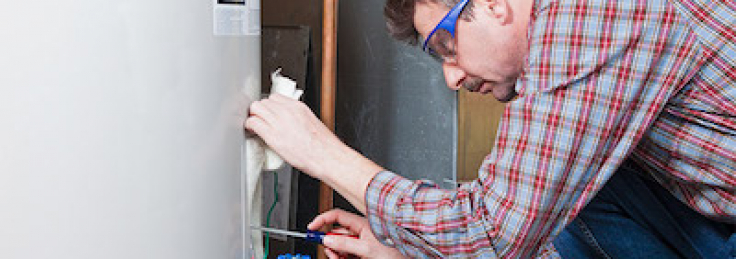The author is making a number of good points regarding Common Problems with Your Home Water Heater overall in this great article just below.

Visualize starting your day without your regular warm shower. That already sets an inadequate tone for the remainder of your day.
Every home needs a reliable water heater, but only a few recognize just how to handle one. One simple way to maintain your hot water heater in top form is to look for faults routinely and repair them as soon as they show up.
Keep in mind to turn off your hot water heater before smelling around for mistakes. These are the water heater mistakes you are most likely to come across.
Water too warm or also chilly
Every hot water heater has a thermostat that identifies just how warm the water gets. If the water entering your residence is too hot regardless of setting a convenient optimum temperature level, your thermostat could be defective.
On the other hand, also cold water may result from a failed thermostat, a damaged circuit, or inappropriate gas flow. For instance, if you make use of a gas water heater with a damaged pilot light, you would certainly get cold water, even if the thermostat is in perfect condition. For electric heating systems, a blown fuse might be the offender.
Not enough hot water
Hot water heater come in several sizes, depending upon your hot water demands. If you run out of hot water before everybody has had a bath, your hot water heater is also small for your family size. You should take into consideration mounting a larger water heater tank or choosing a tankless water heater, which takes up less room as well as is more durable.
Weird noises
There go to least five type of sounds you can hear from a water heater, yet one of the most common analysis is that it's time for the water heater to retire.
First off, you ought to know with the normal appears a water heater makes. An electric heating unit might sound various from a gas-powered one.
Standing out or banging sounds normally suggest there is a slab of sediment in your storage tanks, and also it's time to clean it out. On the other hand, whistling or hissing sounds may just be your shutoffs allowing some stress off.
Water leaks
Leakages could originate from pipes, water connections, valves, or in the worst-case situation, the storage tank itself. Gradually, water will certainly wear away the tank, and discover its way out. If this occurs, you require to change your hot water heater asap.
Nevertheless, before your modification your entire tank, make certain that all pipes are in place and that each shutoff works perfectly. If you still require help recognizing a leakage, call your plumber.
Rust-colored water
Rust-colored water means among your hot water heater elements is corroded. Maybe the anode pole, or the storage tank itself. Your plumber will have the ability to identify which it is.
Warm water
Regardless of just how high you set the thermostat, you will not get any type of warm water out of a heating unit well past its prime. A hot water heater's effectiveness might reduce with time.
You will likewise obtain lukewarm water if your pipes have a cross connection. This suggests that when you turn on a tap, hot water from the heating unit moves in alongside regular, cold water. A cross connection is simple to area. If your hot water taps still follow closing the hot water heater shutoffs, you have a cross link.
Discoloured Water
Corrosion is a major root cause of filthy or discoloured water. Rust within the water storage tank or a stopping working anode rod could cause this discolouration. The anode pole protects the tank from rusting on the inside and also must be examined yearly. Without a pole or an appropriately operating anode rod, the warm water quickly corrodes inside the tank. Contact a professional hot water heater service technician to identify if changing the anode pole will certainly repair the problem; otherwise, replace your hot water heater.
Conclusion
Preferably, your water heater can last one decade before you need an adjustment. However, after the 10-year mark, you may experience any of these faults more frequently. At this moment, you ought to add a brand-new hot water heater to your budget plan.
How To Troubleshoot 3 Common Water Heater Problems in Twin Cities
The Water Heater Is Leaking
A leaky cold water inlet valve A loose pipe fitting A leaky temperature and pressure relief valve A corroded anode rod A cracked tank Turn Off Your Water Heater:
Shut off your gas water heater by turning the gas valve on the unit to the “OFF” position. Shut off your electric water by switching its power off at your electrical panel. Look for a two-pole breaker labeled “water heater” and turn it to the “OFF” position. Move the ball valve connected to the water heater to be perpendicular to the piping at a 90° angle. Look for the Leak:
Depending on whether the water is coming from the tank's top or bottom, you’ll want to look for the leak in different locations.
If the leak comes from the top of the tank, carefully look for water escaping from the cold water inlet valve or loose pipe fittings. Rusted hot and cold water valves can have loose connections with the tank, with water leaking out of them.
https://mspplumbingheatingair.com/blog/how-to-troubleshoot-3-common-water-heater-problems
Hopefully you enjoyed reading our section on Common Problems with Tank Water Heaters. Thank you for finding the time to read our article post. Liked our blog posting? Please share it. Help someone else discover it. We value reading our article about Water Heater Repair and Troubleshooting.
Overflow? We can help!